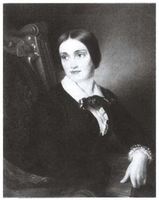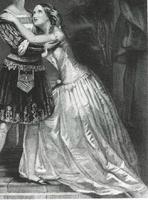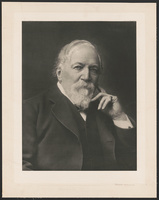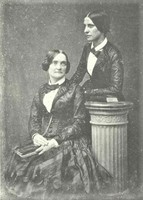Letter from Matilda Hays to Robert Browning, March 3, 1865
Dublin Core
Title
Letter from Matilda Hays to Robert Browning, March 3, 1865
Subject
Hays, Matilda Mary, 1820-1897
Relationships--Networks
Journalists/Writers
Cushman, Charlotte Saunders, 1816-1876
Gender Norms
Finances
Description
Matilda Hays writes to Robert Browning to convince him of her writing skills and career by including her "memorial." She mentions Charlotte Cushman in the context of her short stage career after which she traveled as a "companion" with Charlotte.
Hays speaks of the hardships she encountered during her career, mentions her work for the English Woman's Journal, and asks Browning to sign her memorial in order to receive pension.
Hays speaks of the hardships she encountered during her career, mentions her work for the English Woman's Journal, and asks Browning to sign her memorial in order to receive pension.
Credit
Armstrong Browning Library - The Browning LettersCreator
Hays, Matilda M., 1820-1897
Source
Armstrong Browning Library - The Browning Letters, Digital Collection
Date
1865-03-03
Type
Reference
Letter Item Type Metadata
Text
[page 1] Dear Mr Browning
I do understand your position & enter into it most fully—only I think my disclaimer of literary merit has led you into an error as to my literary labours & consequent bona fide claim upon the Fund in question. Since I was eighteen years of age I have been using my pen, as the enclosed copy of the Memorial sent in to Lord Palmerston will show. I am using it still as my health will allow & have within the last few months written a two volume story
[page 2] which will in time I hope find its way before the Public, & be succeeded by others. I was Literary Editor to the English Woman’s Journal for five years, contributing besides a sheet a month, & 6 large volumes exist in evidence of my industry—while at the same time I was writing for newspapers & other Journals. In fact, I have done an amount of literary hack work, such as few of us female co[n]temporaries I think have surpassed. The Petition for which I asked your valuable name is a brief abstract of this Memorial—which it is in-
[page 3] -tended to support. I am too honest a hater of "shams" myself to prefer any claim which has not a solid foundation—& value your good opinion too highly not to say thus much in my own exoneration. Believe me—dear Mr Browning Yours sincerely Matilda M. Hays _________ Literary works of M. M. Hays. "Helen Stanley" an original Tale– Translations The Last Aldine Simon Mauprat Companion of the Tour of France The Countess of Rudolstadt for Sim[m]s & M’Intyre’s Parlor Library— Little Fadette for Putnam of
[page 4] New York– Contributions to various Journals, Magazines & Newspapers—& Five years literary Editorship of The English Woman’s Journal.
[page 5, envelope]
[page 6, envelope]
[page 7] The Memorial of Matilda M. Hays. As Candidate for a Pension from the Government Literary Fund. Under the circumstances of a long & arduous literary career & broken health, I am advised by literary & other friends to make application for a Pension from the Government Literary Fund. I am aware that these Pensions are very difficult of attainment, & also that my merits weighed against those of many others would be found wanting. At the same time there are circumstances in my case which may perhaps entitle me to consideration, & these I will proceed to state as briefly as possible. In 1838—when just eighteen years of age—I commenced a literary career by contributions to Magazines &c, & was for a time engaged upon
[page 8] "The Mirror." My health gave way & I was for some years an invalid. In 1846 I published a Tale, "Helen Stanley", which attracting considerable attention brought me at once into notice. This was followed in 1847 by a Select Series of Madame G. Sands’ works, of which I was Editor & chief translator. In the same year, having always advocated the better education & training of girls & young women, & their admission into fresh fields of remunerative labour, I endeavored to secure the co-operation of literary friends with a view to starting a "Woman’s Journal"—therebye affording free discussion of a subject for which at that time it was almost impossible to obtain a hearing through the ordinary channels of the Press. The time however was not considered ripe for the experiment, & I was obliged to content myself with such advocacy as opportunity presented. The embarrassed circumstances of
[page 9] my father, in whose hands the small fortune I possessed lay, induced me in 1848 to accede to a proposition from Miss Charlotte Cushman, the American Actress, to try the stage as a more remunerative profession than the one I had chosen, & to fit myself to take the place of her sister—Susan Cushman—then about to marry & retired into private life. To this end, I went through the necessary studies, & having made a successful debût at Bath, continued to play for some months in various parts of the country, among others at Brighton, where several London critics interested in me, were good enough to come & see me, & to predict for me success in my new career. Never strong, the strain of so arduous a part as Juliet to Miss Cushman’s Romeo, constantly repeated, brought on a condition of health which after a short time obliged me to give up the stage altogether. Then followed some years of travel in the United States & Italy, as companion to Miss Cushman,
[page 10] during which my literary labours, were from time to time renewed—in translations, contributions to Journals, & art-letters in Newspapers, among others in the Daily News, until in 1857, in conjunction with Miss Bessie R. Parkes, my former idea of a "Woman’s Journal" was carried out & we started in joint Editorship, "The English Woman's Journal"—which, serving as a nucleus, gave rise in time to the "Society for Promoting the Employment of Women". Until the spring of 1862—five years from the establishment of this Journal—I devoted myself both to the Journal & the Society, drawing a small salary as Editor of the Journal—giving my services otherwise gratuitously to the cause, & eking out my slender means by work in other directions. In the spring of 1862, I was suddenly struck down by brain disease, threatening paralysis, the result of over work & long care & anxiety—for in addition to the necessity of earning my own living,
[page 11] in consequence of the total loss of my means through my father in 1849—my father was himself thrown entirely upon my hands from 1850 to the end of 1862—when it pleased God to take him. Such is a brief outline of the arduous career which leaves me at forty five years of age, crippled in health & wholly dependent for the means of living upon the precarious returns of a Lodging House, in which my small means are invested. Of my exertions in behalf of my own sex it better becomes others than myself to speak—but I may perhaps say, that long before the present movement had organization & recognition I was an earnest advocate to this end—that in its organization I was an active principal, & that for years I devoted myself with unflagging zeal & energy to the cause.— &c &c &c
[page 12, blank page]
[page 13] [Envelope, with docket by Sarianna Browning:] Miss Matilda Hayes, / asking [RB] to sign her memorial, / as a candidate for a pension. / Feb. 1865.
[page 14, envelope]
I do understand your position & enter into it most fully—only I think my disclaimer of literary merit has led you into an error as to my literary labours & consequent bona fide claim upon the Fund in question. Since I was eighteen years of age I have been using my pen, as the enclosed copy of the Memorial sent in to Lord Palmerston will show. I am using it still as my health will allow & have within the last few months written a two volume story
[page 2] which will in time I hope find its way before the Public, & be succeeded by others. I was Literary Editor to the English Woman’s Journal for five years, contributing besides a sheet a month, & 6 large volumes exist in evidence of my industry—while at the same time I was writing for newspapers & other Journals. In fact, I have done an amount of literary hack work, such as few of us female co[n]temporaries I think have surpassed. The Petition for which I asked your valuable name is a brief abstract of this Memorial—which it is in-
[page 3] -tended to support. I am too honest a hater of "shams" myself to prefer any claim which has not a solid foundation—& value your good opinion too highly not to say thus much in my own exoneration. Believe me—dear Mr Browning Yours sincerely Matilda M. Hays _________ Literary works of M. M. Hays. "Helen Stanley" an original Tale– Translations The Last Aldine Simon Mauprat Companion of the Tour of France The Countess of Rudolstadt for Sim[m]s & M’Intyre’s Parlor Library— Little Fadette for Putnam of
[page 4] New York– Contributions to various Journals, Magazines & Newspapers—& Five years literary Editorship of The English Woman’s Journal.
[page 5, envelope]
[page 6, envelope]
[page 7] The Memorial of Matilda M. Hays. As Candidate for a Pension from the Government Literary Fund. Under the circumstances of a long & arduous literary career & broken health, I am advised by literary & other friends to make application for a Pension from the Government Literary Fund. I am aware that these Pensions are very difficult of attainment, & also that my merits weighed against those of many others would be found wanting. At the same time there are circumstances in my case which may perhaps entitle me to consideration, & these I will proceed to state as briefly as possible. In 1838—when just eighteen years of age—I commenced a literary career by contributions to Magazines &c, & was for a time engaged upon
[page 8] "The Mirror." My health gave way & I was for some years an invalid. In 1846 I published a Tale, "Helen Stanley", which attracting considerable attention brought me at once into notice. This was followed in 1847 by a Select Series of Madame G. Sands’ works, of which I was Editor & chief translator. In the same year, having always advocated the better education & training of girls & young women, & their admission into fresh fields of remunerative labour, I endeavored to secure the co-operation of literary friends with a view to starting a "Woman’s Journal"—therebye affording free discussion of a subject for which at that time it was almost impossible to obtain a hearing through the ordinary channels of the Press. The time however was not considered ripe for the experiment, & I was obliged to content myself with such advocacy as opportunity presented. The embarrassed circumstances of
[page 9] my father, in whose hands the small fortune I possessed lay, induced me in 1848 to accede to a proposition from Miss Charlotte Cushman, the American Actress, to try the stage as a more remunerative profession than the one I had chosen, & to fit myself to take the place of her sister—Susan Cushman—then about to marry & retired into private life. To this end, I went through the necessary studies, & having made a successful debût at Bath, continued to play for some months in various parts of the country, among others at Brighton, where several London critics interested in me, were good enough to come & see me, & to predict for me success in my new career. Never strong, the strain of so arduous a part as Juliet to Miss Cushman’s Romeo, constantly repeated, brought on a condition of health which after a short time obliged me to give up the stage altogether. Then followed some years of travel in the United States & Italy, as companion to Miss Cushman,
[page 10] during which my literary labours, were from time to time renewed—in translations, contributions to Journals, & art-letters in Newspapers, among others in the Daily News, until in 1857, in conjunction with Miss Bessie R. Parkes, my former idea of a "Woman’s Journal" was carried out & we started in joint Editorship, "The English Woman's Journal"—which, serving as a nucleus, gave rise in time to the "Society for Promoting the Employment of Women". Until the spring of 1862—five years from the establishment of this Journal—I devoted myself both to the Journal & the Society, drawing a small salary as Editor of the Journal—giving my services otherwise gratuitously to the cause, & eking out my slender means by work in other directions. In the spring of 1862, I was suddenly struck down by brain disease, threatening paralysis, the result of over work & long care & anxiety—for in addition to the necessity of earning my own living,
[page 11] in consequence of the total loss of my means through my father in 1849—my father was himself thrown entirely upon my hands from 1850 to the end of 1862—when it pleased God to take him. Such is a brief outline of the arduous career which leaves me at forty five years of age, crippled in health & wholly dependent for the means of living upon the precarious returns of a Lodging House, in which my small means are invested. Of my exertions in behalf of my own sex it better becomes others than myself to speak—but I may perhaps say, that long before the present movement had organization & recognition I was an earnest advocate to this end—that in its organization I was an active principal, & that for years I devoted myself with unflagging zeal & energy to the cause.— &c &c &c
[page 12, blank page]
[page 13] [Envelope, with docket by Sarianna Browning:] Miss Matilda Hayes, / asking [RB] to sign her memorial, / as a candidate for a pension. / Feb. 1865.
[page 14, envelope]
From
Hays, Matilda M., 1820-1897
To
Browning, Robert, 1812-1889
Location
Malvern, UK
Geocode (Latitude)
52.1159559
Geocode (Longitude)
-2.3258985
Location (Recipient)
Esqre / 19 Warwick Crescent / Upper Westbourne Road [sic] / London, UK
Geocode Recipient (Latitude)
51.5440865
Geocode Recipient (Longitude)
-0.1105708
Provenance
Social Bookmarking
Geolocation
Collection
Citation
Hays, Matilda M., 1820-1897, “Letter from Matilda Hays to Robert Browning, March 3, 1865,” Archival Gossip Collection, accessed July 3, 2024, https://archivalgossip.com/collection/items/show/600.






